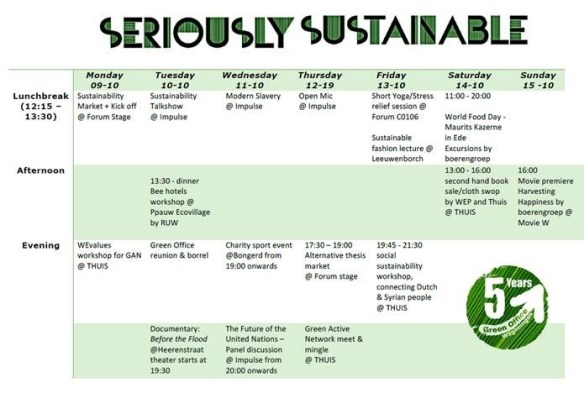This is an internship for Dutch speaking students who can make a five month commitment.
Over Greendish
Greendish heeft sinds haar oprichting in 2011 professionals uit de food service industrie geholpen in hun transitie naar gezonde en duurzame menu’s en werkwijzen die goed zijn voor de mens, het bedrijf en onze aarde.
In de food service industrie zien we veel onwetendheid en misverstanden over duurzaamheid en gezond eten; het zou bijvoorbeeld duur, moeilijk en niet lekker zijn. Door de dreiging van klimaatverandering en de stijgende behoefte aan voedsel, kunnen we deze misverstanden niet langer negeren. Als verantwoordelijke professionals, moeten we het heft in eigen handen nemen om de transitie te starten die nodig is voor de toekomst van de sector en van onze planeet. Wij geloven dat juist deze sector-pioniers uiteindelijk boven de rest uit zullen stijgen en over de hele linie het meest succesvol zullen zijn.
Met ons ambitieuze team van voedingsdeskundigen, chefs en gedragswetenschappers werken wij er hard aan te zorgen dat gezond- en duurzaam eten makkelijk, lekker en overal toegankelijk is voor iedereen.
Het project ‘Restaurants van Morgen’
“Gezond voor de consument, duurzaam voor de samenleving en kostenbesparend voor de horecaondernemer! Dat is wat Greendish en Natuur & Milieu met Restaurants van Morgen willen bereiken.”
Over het project
Restaurants van Morgen (afgekort RvM) is een project waarin Greendish samenwerkt met de organisatie Natuur & Milieu. Binnen het project begeleiden we 23 restaurants in de Regio Foodvalley (gemeenten Ede, Nijkerk, Rhenen, Veenendaal en Wageningen) naar een duurzamere toekomst. Het project bestaat uit drie fases: de nulmeting (T0), de begeleiding, en de T1 meting. De nulmeting is afgelopen jaar uitgevoerd. Hierin gingen we bij alle restaurants langs en hielden we een interview met de chefs/eigenaren. Verder onderzochten we onderwerpen zoals de samenstelling van de menukaart, waste en inkoop. Ook de top-5 populairste hoofdgerechten werd volledig doorgemeten. De restaurants zijn inmiddels op de hoogte gebracht van de resultaten. Momenteel zijn wij bezig met de tweede fase van het onderzoek, de begeleiding. Voor deze begeleiding zijn er twee trajecten opgezet, light begeleiding (LB) en intensieve begeleiding (IB). De intensieve begeleiding wordt gegeven aan acht daarvoor uitgekozen restaurants. Voor hen wordt samen met ons een plan op maat gemaakt. De rest van de restaurants krijg light begeleiding, waarmee we op een wat algemener niveau informatie met de restaurants zullen delen over verschillende onderwerpen rondom duurzaamheid. Na afronding van de begeleidingsfase zal er een tweede meting worden uitgevoerd, de T1 meting. Dit is waar jij potentieel je steentje zult gaan bijdragen!
Wat zul je zoal gaan doen?
De meetmethoden voor de T1 metingen hebben we inmiddels ontwikkeld. Jouw bijdrage aan de T1 meting zal onder andere bestaan uit:
- Het inplannen van afspraken
- Langsgaan op locaties met Greendish medewerkers
- Interviews houden of aantekeningen nemen (kwalitatief onderzoek)
- Wegingen doen van gerechten in de restaurants, vergelijkbaar aan de T0 meting (kwantitatief onderzoek)
- Het effect laten zien van de interventie op hoeveelheden, bereiding, inkoopbeleid en meer
- Analyse van de resultaten en het verschil tussen T0 en T1
- De resultaten visualiseren aan de hand van een presentatie
- Adviezen samenstellen voor restaurants
Overige werkzaamheden
Werken bij Greendish is erg divers, en in overleg kunnen er dus zomaar andere leuke taken bijkomen waarmee jij een inkijk krijgt in de dagelijkse werkzaamheden van onze stichting!
Wat verwachten wij van jou?
Greendish bestaat uit een klein team, waar we onderling leuk met elkaar omgaan. Zo lunchen we gezamenlijk en organiseren we maandelijks een borrel of andere activiteit. We zijn open en informeel en bieden veel ruimte voor eigen inbreng. Zowel het werken in teamverband als zelfstandig kunnen werken is belangrijk. Een stage bij Greendish is uitdagend maar leerzaam en op het grensgebied tussen Wetenschap en praktijk.
Wil je impact maken en bijdrage aan verandering in de samenleving waarbij miljoenen eetmomenten van consumenten onderweg op stations, luchthavens, in restaurants en tijdens de lunch op kantoor gezonder en duurzamer worden, dan bij je bij ons aan het juiste adres!
Meld je aan via https://greendish.org/nl/internship-position-nl/
Contactpersoon: rose.korte@greendish.org



